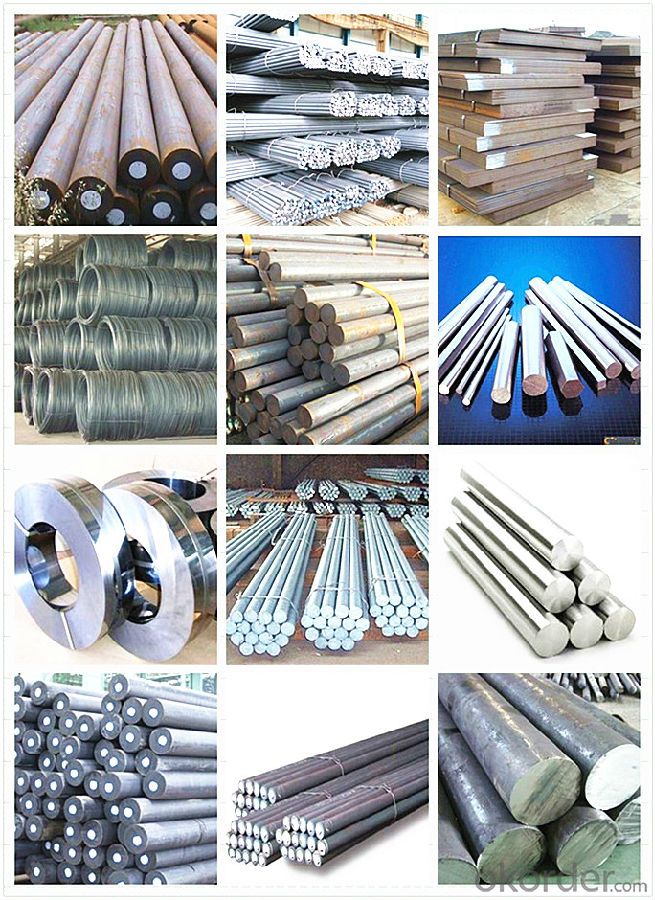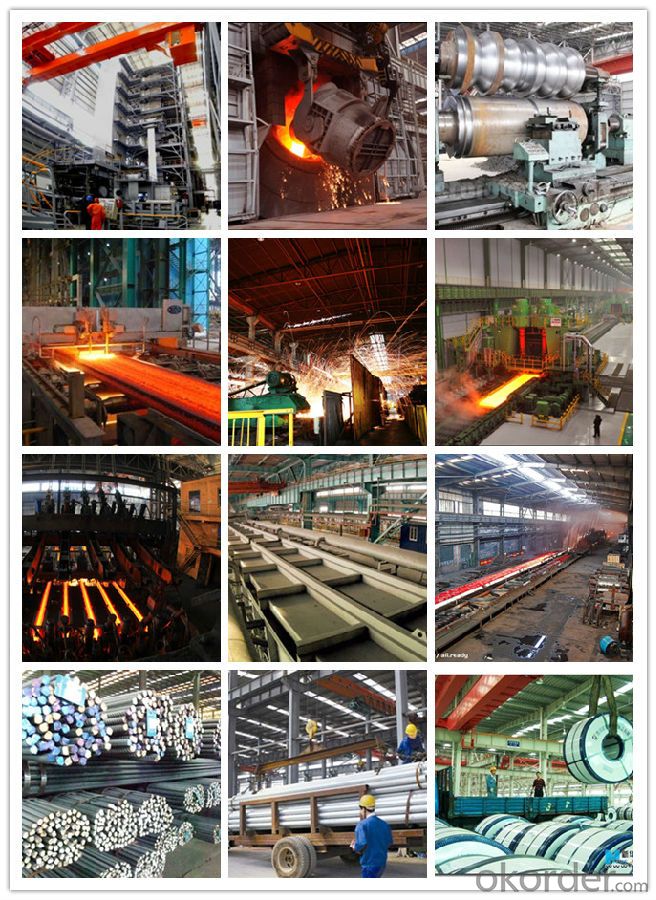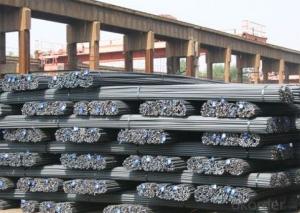Special Steel Reinforcing Steel Bars HRB500 Rebars
- Loading Port:
- China main port
- Payment Terms:
- TT OR LC
- Min Order Qty:
- 30 m.t.
- Supply Capability:
- 10000 m.t./month
OKorder Service Pledge
OKorder Financial Service
You Might Also Like
Item specifice
Product Information
1.Specification
Diameter(mm) | Φ6 ,Φ8,Φ10,Φ12,Φ13,Φ14,Φ16,Φ18,Φ20,Φ22,Φ25,Φ28,Φ32,Φ36,Φ40,Φ50 |
Length(m) | Unfolded / Straight Bundles weighing upto 2 Metric Tons and lengths is 6 Meters up to 15 Meters or according customers require |
U Shaped folded Bundles weighing up to 2 Metric Tons and lengths is 12 Meters | |
Rounded Coils ~ up to 2 Metric Ton Coils for Bending / Cutting Machine use. | |
Standard | GB(HRB335/HRB400/HRB500); |
BS4449 -1997 GRADE 250B, 460B; BS4449-2005 GRADE 500B; | |
ASTM A615 GRADE 40,GRADE60,GRADE75; ASTM A706; | |
DIN488-1 420S/500S, BST500S | |
JIS G3112 SD35, SD40, SD50,SD390 | |
NFA 35016 FE E 400, FE E 500 | |
CA 50/60 | |
GOST A3 R A500C | |
Surface finished | Screw-thread |
Epoxy coating | |
Galvanized coating | |
Production facility | Imports of production equipment from Italy |
Production capacity | 50,000 MT/month |
Payment term | T/T or 100% L/C at sight |
Package | In bundles. One bundles about 2-3tons |
2.Chemical composition
Grade | Technical data of the original chemical composition (%) | |||||
C | Mn | Si | S | P | B | |
HRB335 | ≤0.25 | ≤1.60 | ≤0.80 | ≤0.045 | ≤0.045 | >0.0008 |
Physics capability | ||||||
Yield Strength (N/cm2) | Tensile Strength (N/cm2) | Elongation (%)
| ||||
≥335 | ≥490 | ≥16 | ||||
Grade | Technical data of the original chemical composition (%) | |||||
C | Mn | Si | S | P | V | |
HRB400 | ≤0.25 | ≤1.60 | ≤0.80 | ≤0.045 | ≤0.045 | 0.04-0.12 |
Physics capability | ||||||
Yield Strength (N/cm2) | Tensile Strength (N/cm2) | Elongation (%)
| ||||
≥400 | ≥570 | ≥14 | ||||
3.Theorectical weight
Diameter (MM) | Cross Sectional Area (MM2) | Theorectical Weight (KG/M) | Weight of 12M Bar (KG) | A Ton Contains 12M Bars (PCS) |
6 | 28.27 | 0.222 | 2.664 | 375.38 |
8 | 50.27 | 0.395 | 4.74 | 210.97 |
10 | 78.54 | 0.617 | 7.404 | 135.06 |
12 | 113.1 | 0.888 | 10.656 | 93.84 |
14 | 153.9 | 1.21 | 14.52 | 68.87 |
16 | 201.1 | 1.58 | 18.96 | 52.74 |
18 | 254.5 | 2 | 24 | 41.67 |
20 | 314.2 | 2.47 | 29.64 | 33.74 |
22 | 380.1 | 2.98 | 35.76 | 27.96 |
25 | 490.9 | 3.85 | 46.2 | 21.65 |
28 | 615.8 | 4.83 | 57.96 | 17.25 |
32 | 804.2 | 6.31 | 75.72 | 13.21 |
36 | 1018 | 7.99 | 98.88 | 10.43 |
40 | 1257 | 9.87 | 118.44 | 8.44 |
Product Show

Workshop Show

Shipping
1. FedEx/DHL/UPS/TNT for samples, Door-to-Door;
2. By Air or by Sea for batch goods, for FCL; Airport/ Port receiving;
3. Customers specifying freight forwarders or negotiable shipping methods!
Delivery Time: 3-7 days for samples; 5-25 days for batch goods.
Payment Terms
1.Payment: T/T, L/C, Western Union, MoneyGram,PayPal; 30% deposits; 70% balance before delivery.
2.MOQ: 1pcs
3.Warranty : 3 years
4.Package Informations: 1) EXPORT, In 20 feet (GW 25 ton) or 40 feet Container (GW 25 ton)
2)as customer's requirement
Why choose us?
(1) The leading exporter in China special steel industry.
(2) Large stocks for various sizes, fast delivery date.
(3) Good business relationship with China famous factories.
(4) More than 7 years steel exporting experience.
(5) Good after-sales service guarantee.
- Q:Can special steel be used in the production of musical instruments?
- Yes, special steel can be used in the production of musical instruments. It is commonly used for strings, guitar frets, and some wind instrument components due to its specific acoustic properties and durability.
- Q:What are the different surface coatings applied to special steel?
- Some of the different surface coatings applied to special steel include galvanization, powder coating, electroplating, and thermal spray coatings. These coatings serve various purposes such as corrosion resistance, improved aesthetics, increased durability, and enhanced electrical conductivity.
- Q:How does special steel behave under different types of loading conditions?
- Special steel behaves differently under different types of loading conditions. When subjected to tension, it stretches and elongates, but still maintains its strength. Under compression, it can withstand high pressures without deformation. Special steel also exhibits excellent resistance to bending, allowing it to maintain its shape under bending loads. Furthermore, it has high fatigue strength, making it suitable for applications involving cyclic or repetitive loading. Overall, special steel demonstrates superior mechanical properties and performance under various loading conditions.
- Q:What are the different methods of surface electroplating for special steel?
- There are several methods of surface electroplating for special steel, including electroless plating, electroplating by immersion, barrel plating, and rack plating. Electroless plating is a chemical process that uses a reducing agent to deposit a layer of metal onto the steel surface. Electroplating by immersion involves immersing the steel in an electrolyte bath and applying an electric current to deposit a metal coating. Barrel plating is a method where the steel parts are placed in a rotating barrel along with the plating solution, creating a tumbling action that ensures an even coating. Rack plating involves suspending the steel parts on a rack and immersing them in the plating bath. Each method has its own advantages and is chosen based on the specific requirements and characteristics of the special steel being plated.
- Q:What is the difference between special steel and regular steel?
- Special steel refers to steel that has been specially manufactured or treated to possess specific properties or characteristics that regular steel does not have. This can include higher strength, better corrosion resistance, improved ductility, or enhanced heat resistance. Regular steel, on the other hand, refers to the general classification of steel that is commonly produced and used in various applications without any specific modifications or unique attributes.
- Q:How does special steel contribute to the defense aftermarket industry?
- The defense aftermarket industry heavily relies on special steel to manufacture essential materials for defense equipment and components. Special steel possesses exceptional properties, including strength, durability, and resistance to corrosion and extreme temperatures, making it the preferred choice for producing military vehicles, aircraft, weapons, and defense systems. One significant contribution of special steel to the defense aftermarket industry is its use in armor and ballistic protection. By utilizing special steel alloys, armor plates and panels can be created to withstand high-velocity impacts, providing crucial protection for military personnel and vehicles against enemy fire. These materials offer enhanced protection, reducing the risk of casualties and damage during combat. Furthermore, special steel is essential in the production of aerospace components. Military aircraft are vital for various defense operations, such as reconnaissance, surveillance, and combat. Special steel alloys ensure the safety, reliability, and performance of these aircraft by manufacturing critical components like landing gear, engine parts, and structural elements. Special steel's resistance to corrosion and extreme conditions also makes it suitable for constructing naval vessels and submarines. These assets operate in harsh marine environments, facing saltwater, extreme temperatures, and constant mechanical stress. Special steel alloys with high-strength properties and corrosion resistance are utilized in building ship hulls, propeller shafts, and critical components, ensuring longevity and operational effectiveness. Moreover, special steel contributes to the defense aftermarket industry through its role in the supply chain. The production and maintenance of defense equipment and components often require specialized machinery and tools, which are made from special steel. The availability of these materials is crucial for maintaining a robust defense industry and enabling efficient production and maintenance of defense systems. In conclusion, special steel plays a vital role in the defense aftermarket industry by providing the necessary materials for producing high-performance, reliable, and durable defense equipment. Its unique properties contribute to the safety, effectiveness, and longevity of military vehicles, aircraft, weapons, and naval vessels, ultimately enhancing the capabilities of defense forces worldwide.
- Q:How are aluminum alloys used in the automotive industry?
- Aluminum alloys are extensively used in the automotive industry due to their lightweight, high strength, and corrosion-resistant properties. These alloys are commonly utilized in the manufacturing of various components, such as engine blocks, cylinder heads, wheels, and body panels. By incorporating aluminum alloys, vehicles can achieve improved fuel efficiency, better performance, and enhanced safety while reducing overall weight and emissions.
- Q:What are the properties of corrosion-resistant stainless tool steel?
- Corrosion-resistant stainless tool steel possesses a number of key properties. Firstly, it exhibits excellent resistance to corrosion, making it highly durable and suitable for use in corrosive environments. It also has high strength and hardness, ensuring its effectiveness as a tool material. Additionally, this type of steel offers good wear resistance, enabling it to withstand repeated use without significant deterioration. Moreover, it retains its sharpness and cutting edge for extended periods, making it an ideal choice for various cutting and machining applications. Overall, the properties of corrosion-resistant stainless tool steel make it a reliable and long-lasting option for demanding industrial and manufacturing settings.
- Q:Can special steel be used in the aerospace defense industry?
- Yes, special steel can be used in the aerospace defense industry. It is commonly used for manufacturing various components and structures in aircraft and defense systems due to its high strength, durability, and resistance to extreme temperatures and corrosion.
- Q:What are the common challenges in machining special steel?
- Machining special steel can present several common challenges that need to be effectively addressed in order to achieve desired results. One of the primary challenges in machining special steel is its high hardness and toughness. Special steels are often alloyed with various elements to enhance their properties, making them harder and more resistant to wear and corrosion. This hardness can cause increased tool wear and reduced tool life, requiring the use of specialized cutting tools and techniques. Another challenge in machining special steel is its low thermal conductivity. Special steels are known to have poor heat dissipation properties, leading to the accumulation of heat during the machining process. This heat buildup can cause thermal deformation, leading to dimensional inaccuracies and poor surface finish. Proper cooling and lubrication techniques, as well as appropriate cutting speeds and feeds, are crucial to overcome this challenge and prevent thermal damage. Additionally, special steels often have complex microstructures due to their alloying elements, which can result in uneven material removal and surface finish. These microstructural variations can make the machining process more unpredictable and challenging. Careful selection of cutting parameters, tooling, and machining strategies is necessary to ensure consistent and accurate results. Furthermore, some special steels may exhibit work hardening tendencies during machining. This means that as the material is being cut, it becomes harder and more resistant to further cutting. This work hardening can lead to increased cutting forces, tool wear, and poor surface finish. Utilizing appropriate cutting speeds, feeds, and tool geometries can help mitigate this challenge and prevent work hardening. Finally, special steels often come with higher manufacturing costs due to the complexity of their composition and the need for specialized tooling and equipment. The selection of suitable cutting tools, fixtures, and machining processes may require additional investment and expertise. Therefore, understanding the specific characteristics and challenges of machining special steel is crucial to ensure efficient and cost-effective production.
1. Manufacturer Overview |
|
|---|---|
| Location | |
| Year Established | |
| Annual Output Value | |
| Main Markets | |
| Company Certifications | |
2. Manufacturer Certificates |
|
|---|---|
| a) Certification Name | |
| Range | |
| Reference | |
| Validity Period | |
3. Manufacturer Capability |
|
|---|---|
| a)Trade Capacity | |
| Nearest Port | |
| Export Percentage | |
| No.of Employees in Trade Department | |
| Language Spoken: | |
| b)Factory Information | |
| Factory Size: | |
| No. of Production Lines | |
| Contract Manufacturing | |
| Product Price Range | |
Send your message to us
Special Steel Reinforcing Steel Bars HRB500 Rebars
- Loading Port:
- China main port
- Payment Terms:
- TT OR LC
- Min Order Qty:
- 30 m.t.
- Supply Capability:
- 10000 m.t./month
OKorder Service Pledge
OKorder Financial Service
Similar products
New products
Hot products
Related keywords






























